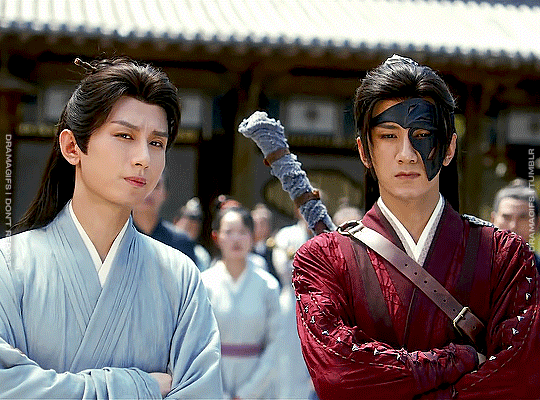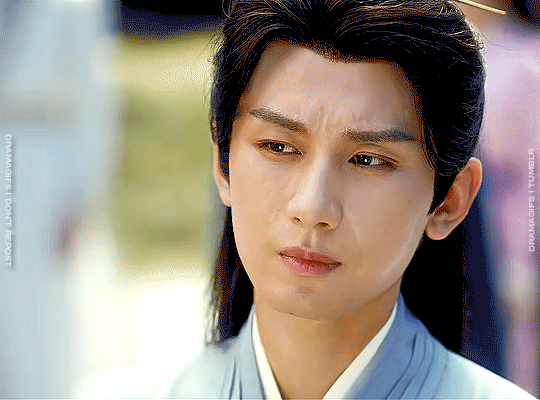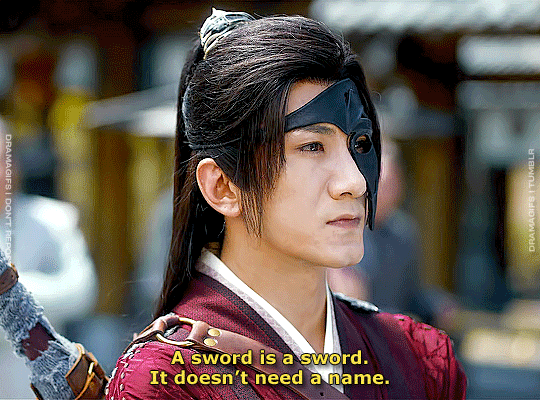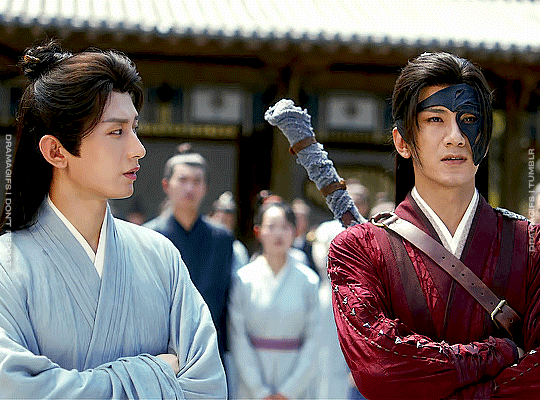Text
CQL/The Untamed's Original script (Compilation of Deleted Scenes)
Note: This is an updated version of an old post from my sideblog. Leaks from the original script are still coming out occasionally so this post might have to be updated again sometime in the future.
Episode 13
Wei Wuxian saves Wen Qing from being hit by Wang Lingjiao's iron brand.
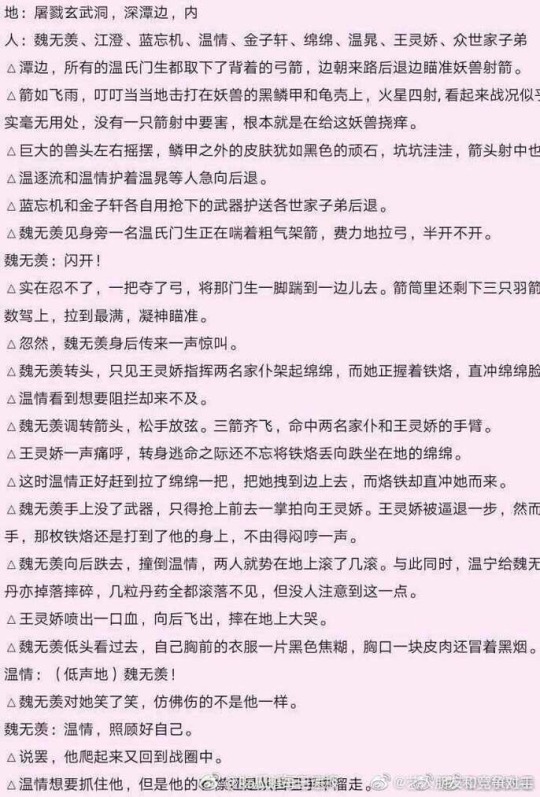

🔗 Video
Wang Lingjiao attempts to burn Mianmian with the iron brand. Wen Qing pushes Mianmian away and she almost gets hit by the iron brand. Wei Wuxian swoops in and saves Wen Qing.
Wei Wuxian fell backwards, also knocking Wen Qing down, the two of them rolling across the ground together [...] Wei Wuxian looked down at his chest, his clothes were scorched black and smoke was rising from his burnt flesh.
Wen Qing: (whispering) "Wei Wuxian!"
Wei Wuxian smiled at her as if he wasn't hurt.
Wei Wuxian: "Wen Qing, take care of yourself,"
Then he got up and returned to the ongoing battle. Wen Qing reached out, wanting to hold on to him, but his robes slipped from her fingers.
(‼️ In the novel, Wei Wuxian rescued Mianmian.)
Episode 19
When Wei Wuxian gets caught by Wen Chao and Wang Lingjiao after the golden core transfer, they bring Wen Qing in and threaten to kill her in front of him.
Wang Lingjiao: "That day in Xuanwu Cave, the hero rescued this beautiful maiden. Does Miss Wen keep you inside her heart? Shall I rip her heart out so you can see it for yourself?"
Episode 36
When Wei Wuxian unseals Wen Ning's consciousness there are some deleted lines of Wei Wuxian inquiring after Wen Qing's whereabouts.
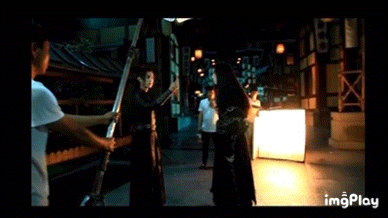
🔗 Full video with audio
Wei Wuxian: "So that is to say...you have no idea where to find Wen Qing, either?"
Episode ???
Not sure which episode this is from but it should be post-reincarnation and before episode 39.
Wei Wuxian dreamed that after he fell off the cliff he woke up in a stone cave with his body covered in bandages. Wen Qing is in the cave with him, crushing herbs and brewing medicine.
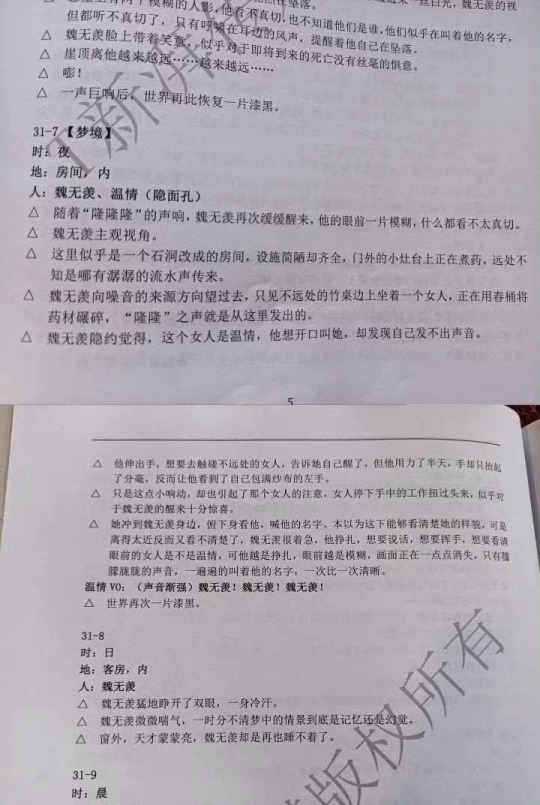
31-6
[...] He couldn't see the figures clearly, couldn't recognize who they were. They seemed to be calling his name but he couldn't hear them clearly. The sound of the wind whistling in his ears reminded him that he was falling. Wei Wuxian wore a smile on his face, unbothered by the prospect of imminent death. The edge of the cliff is getting farther and farther away from him....farther and farther away...
Boom!
A loud noise, and then the world around him was plunged into darkness.
31-7 [Dreamscape]
Time: Night
Location: Inside a room
Characters: Wei Wuxian, Wen Qing (with her face concealed)
Wei Wuxian wakes up in a stone cave outfitted with basic facilities. Medicine was being boiled in a small pot, and sitting on a bamboo table near him was a woman who was crushing medicinal herbs. His vision is blurry but he thinks this woman is Wen Qing.
He tried to call out to her but realized that he couldn't make a sound. He stretched out his hand, wanting to touch the woman and tell her that he was awake, but he couldn't move his body. After several attempts he could only lift his hand, and it was then that he saw that his arm was covered in bandages. The woman finally realized he was awake and she quickly rushed to his side, overjoyed.
She rushed to Wei Wuxian, bent down to look at him, and called out his name. He still couldn't see her face properly. Wei Wuxian was very anxious. He struggled, wanted desperately to talk to her, wanted to wave his hands. He wanted to see if the woman in front of him really was Wen Qing, but the more he struggled, the more his vision blurred. The image before him slowly started to fade, leaving only her hazy voice calling his name over and over again.
Wen Qing voiceover: (voice getting louder and louder) "Wei Wuxian! Wei Wuxian! Wei Wuxian!
Then the world was plunged into darkness once again.
31-8
Time: Day
Location: Guest Room
Character: Wei Wuxian
Wei Wuxian suddenly opened his eyes. His entire body was covered in cold sweat and he was panting lightly. For a moment, he was unable to tell whether the scene he saw was merely a dream, or if it was actually a memory.
Outside the window, dawn was just beginning to break, but Wei Wuxian could no longer fall asleep.
(‼️ These scenes seem to imply that after he fell off the cliff, Wen Qing took him away, brought him somewhere else, and then tried to save him. In the novel, he was ripped to shreds by fierce ghosts and didn't leave an intact corpse, but the way he died in CQL should have left a corpse. This is a 'plothole' that people have been bringing up often since the show first aired. These deleted scenes with Wen Qing could explain why nobody found Wei Wuxian's body, and also why Jiang Cheng managed to retrieve the flute from the bottom of the cliff, but not his corpse.)
Episode 39
Wei Wuxian walks around Tanzhou city market and mistakes a random woman in red for Wen Qing.
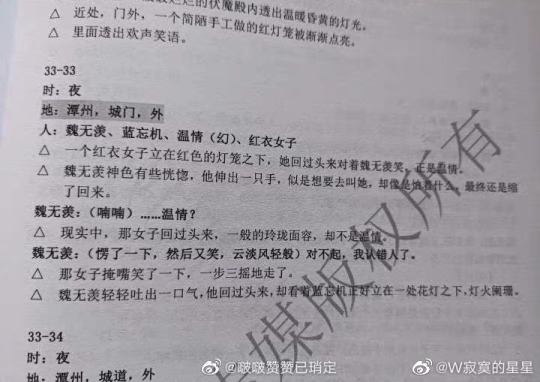
33-33
Time: Night
Location: Tanzhou City Gate
Characters: Wei Wuxian, Lan Wangji, Wen Qing (illusion), Random woman in red
A woman in dressed in red stood under a lantern. She turned her head and smiled at Wei Wuxian. It was Wen Qing. Wei Wuxian stared at her in a daze. He slowly reached out a hand, wanting to call out to her, but hesitated.
Wei Wuxian: (in a soft voice) "...Wen Qing?"
But then reality struck him as the woman turned around. Although she had a lovely face, she was not Wen Qing.
Wei Wuxian: (Had a blank look on his face, then he laughed casually) "Sorry about that! I mistook you for somebody else,"
The woman covered her mouth, and walked away with a smile. Wei Wuxian sighed softly, then turned around and saw Lan Wangji standing under a dim lantern.
Episode 43
Wei Wuxian asks Lan Xichen about the scars on Lan Wangji's back. Lan Xichen tells him that back when Wen Qing surrendered herself for punishment to the Jin clan, Lan Wangji broke into Jinlintai to rescue her, and fought with cultivators from the LanlingJin and GusuLan in order to protect her.
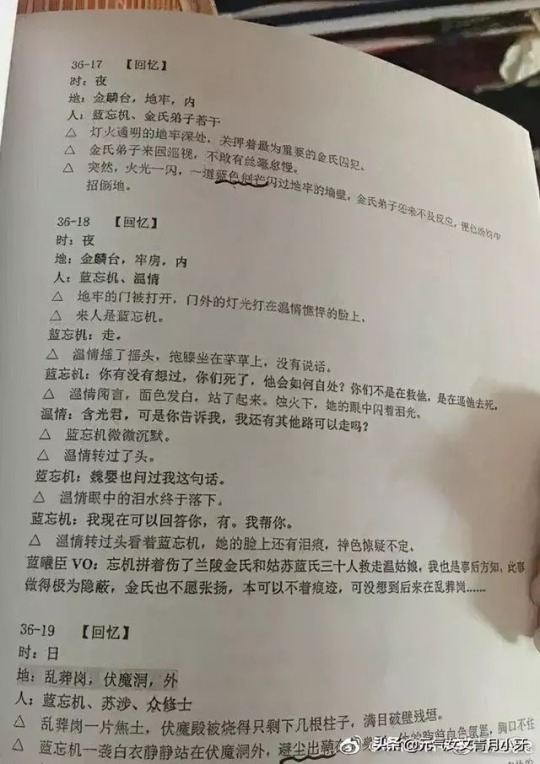

🔗 Full video
36-17 [Memories]
In the dungeons of Jinlintai, where Wen Qing is being held as prisoner, the Jin cultivators standing guard suddenly fall unconscious to the floor.
36-18 [Memories]
Lan Wangji enters the dungeon where Wen Qing is held captive. He asks her to leave with him and she refuses. Lan Wangji tells her that by sacrificing herself, she's only hurting Wei Wuxian. She asks him if she has any other choice.
Wen Qing: "Then tell me, Hanguang-jun, is there any other path I can take?"
Lan Wangji fell silent. Wen Qing turned away from him.
Lan Wangji: "Wei Ying also asked me this question,"
Tears finally started falling from Wen Qing's eyes.
Lan Wangji: "I now have an answer, I'll help you,"
Wen Qing turned to look at Lan Wangji. Her face was streaked with her tears and her expression was uncertain.
Lan Xichen voiceover: "Wangji fought and injured thirty cultivators from the LanlingJin and the GusuLan in order to rescue Miss Wen. This matter was kept secret, and the Jin clan did not wish to make it public. It could have been swept under the rug, but I didn't expect that later on..."
36-19 [Memories]
Lan Wangji stands in front of the Burial Mounds, surrounded by other cultivators and Su She (I think this is the scene where Lan Wangji says: "You are not qualified to talk to me" but the rest of the script is not visible in the photo)
(‼️In the novel, the one that Lan Wangji rescued was Wei Wuxian. Lan Wangji fought and injured 33 Lan elders in order to protect him, and because of that he was punished severely using a discipline whip, which left him with deep scars on his back. This is one of the most important WangXian scenes and is a major turning point in their relationship)
Episode 46
In Wei Wuxian and Jiang Cheng's argument leading up to the golden core reveal, Jiang Cheng says that he thinks Wen Qing is alive. He then accuses Wei Wuxian of hiding her from him. Wei Wuxian insists that he doesn't know where Wen Qing is either.
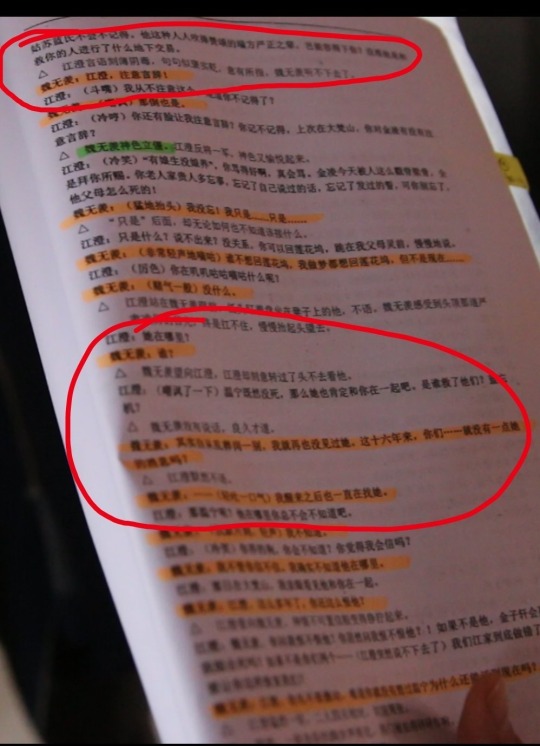
(Can you tell whose script this is? It's Xiao Zhan's 😂)
Episode 50
After the conversation with Nie Huaisang in Cloud Recesses, Wei Wuxian and Lan Wangji part ways. Lan Wangji leaves to become Chief Cultivator while Wei Wuxian goes on a journey to find Wen Qing. The story ends after Wen Qing and Wei Wuxian reunite.
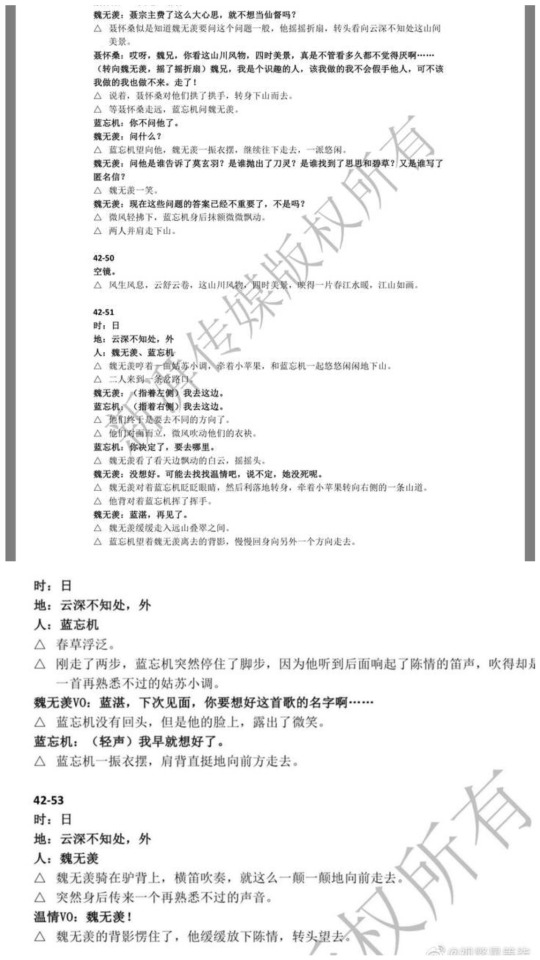
42-51
After their confrontation with Nie Huaisang in Cloud Recesses, Wei Wuxian and Lan Wangji part ways.
They are finally going in different directions. They stood facing each other, the breeze rustling their robes.
Lan Wangji: "Have you decided where to go?"
Wei Wuxian looked up at the white clouds floating in the sky and shook his head.
Wei Wuxian: "I haven't. I think I'll go look for Wen Qing. Perhaps she's still alive,"
Wei Wuxian then turned and led Little Apple down the mountain path. With his back turned to him, Wei Wuxian raised his hand and waved.
Wei Wuxian: "Lan Zhan, goodbye,"
Wei Wuxian walked into the distant mountains, amongst the emerald-colored greenery. Lan Wangji watched Wei Wuxian's retreating figure before slowly turning around and walking in a different direction.
42-52
Lan Wangji suddenly stopped walking. He could hear the sound of the flute Chenqing from a distance, playing a very familiar Gusu tune.
Wei Wuxian voiceover: "Lan Zhan, the next time we meet each other, you better have a name for this song,"
Lan Wangji did not look back, but there was a smile on his face.
Lan Wangji: "Way ahead of you,"
Lan Wangji shook the hems of his robes, and continued walking forward.
42-53
Wei Wuxian played a tune on his flute as he rode on top of his donkey. Suddenly, a familiar voice called out to him from behind.
Wen Qing voiceover: "Wei Wuxian!"
Wei Wuxian was stunned. He slowly put Chenqing down and turned his head to look behind him.
[END]
Character Biography
It's stated in both of their CQL character descriptions that Wen Qing is alive, and that Wei Wuxian looks for her at the end.
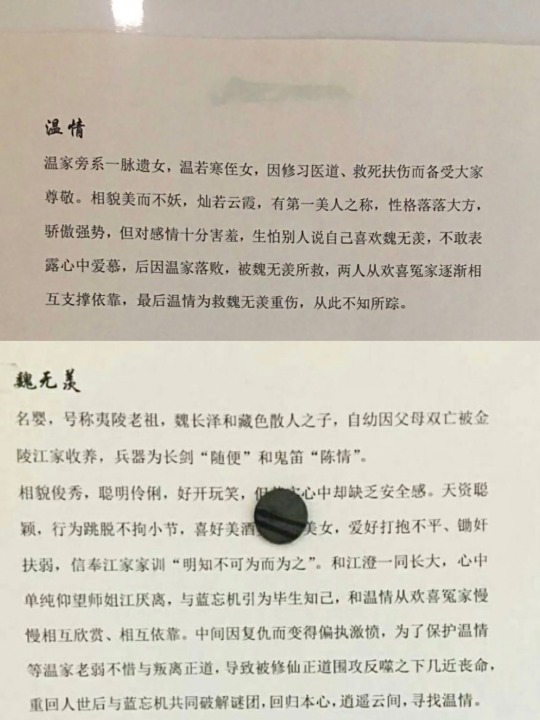
WEN QING
'Wen Ruohan's niece, descended from the branch side of the Wen family, who is a highly respected medical practitioner. She is known as a peerless beauty of the realm and has a generous and proud personality, but she is very shy when it comes to her feelings. Afraid that other people will say that she likes Wei Wuxian, she took great pains to hide the admiration that she felt for him in her heart. After the fall of the Wen clan, she was rescued by Wei Wuxian and the two of them become a quarrelsome yet loving couple who relied on each other for support. Later on, Wen Qing rescued a heavily injured Wei Wuxian, then she disappeared without a trace.'
WEI WUXIAN
[...] After his return, he worked together with Lan Wangji to solve the mysteries of his past, and in the end, he went to find Wen Qing.
(‼️ There are more deleted scenes that were leaked but they were very minor, inconsequential scenes: Wen Qing fainting in Wei Wuxian's arms, the two of them holding hands in Qiongqi pass, the two of them sitting together in the floor of Xuanwu cave, etc, etc, and since tumblr limits the amount of photos per post, I only chose the most plot-relevant leaks. Most of them can still be found on weibo)
441 notes
·
View notes
Text
WHY YOU SHOULD WATCH 莲花楼 MYSTERIOUS LOTUS CASEBOOK
Guess I’m back for another rec, you know I’m there when I get minimum two bromance dudes and historical and OOMPH if you liked The Blood of Youth this might be up your lane!! Slightly similar main character premise but super good, the trope never gets old!!

TL;DR
- Stupid disciple + his (unknowing) shifu
- Enemy bros “where is my shixiong’s remains?!” + “defeat me and find out” vibes who have to work together and form their deep friendship and get past misunderstanding and mystery blah blah love it
- All-powerful legendary swordsman losing all his powers and becoming a legendary physician
- Everything is about dead shixiong we don’t even know how the man looks like
- Investigations and jianghu shenanigans, cases!!!
- Uwu puppy dog and good in martial arts disciple and his sickly, ex-legendary and still cool shifu who doesn’t know he’s a shifu LMAO
- Yes uwu bromance, especially cuz shifu is DYING and he is WEAK and he gonna spit out blood and faint everywhere as they find cure for him
———–
AIRING DEETS
Total episodes: 40
Premiered on: July 23
VIP ends: August 18
Can be watched from iQiyi
Airing schedule: 6 episodes on the first day, 2 episodes everyday after for 6 days, then 8 episodes a week except for the last week, that has 6 episodes with finale
SUMMARY
Ten years ago, Li Xiangyi who was master of Sigu Sect, challenged Di Feisheng, master of the Jinyuan Alliance, to a fight on the seas, where they both end up critically hurt as Li Xiangyi tries to find out where his shixiong’s (Shan Gu Dao) corpse and bones went - his sect was attacked on the same day, and when he returns to the sect, critically injured, he sees some of his deputies blaming him for the attack, and instead of going in, he disappears after that.
Ten years later, Li Xiangyi is now Li Lianhua (Lotus Li LMAO) and he’s an eccentric but skilled doctor who has his eyes on earning money. By chance, he meets Fang Duobing (Fang Many Illness LMAO), a young, aspiring detective who’s super skilled in martial arts, but he’s been unable to enrol in Bai Chuan Yuan (the past Sigu Sect), a sort-of sect that plays an enforcer role in the pugilistic world and helps to solve cases, arrest wrongdoers, and the like. Fang Duobing’s dream is to get in, but as he’s the only son of two powerful people who’ve been refusing to let him be part of Bai Chuan Yuan, he’s failed the test 3 times despite being the most-skilled one there. On his third try, however, he tells the four masters of Bai Chuan Yuan that his shifu is Li Xiangyi, a Li Xiangyi who used to be a part of Bai Chuan Yuan and is still greatly missed by the four masters. They agree to it, but only if FDB solve three cases with arrests.
His first case leads him to meet LXY who’s now known as Li Lianhua, and their meeting doesn’t go off to a great start; FDB is idealistic and a rich, wealthy young master at heart who’s never suffered much hardship, and LLH drugs him after and scolds him for being too trusting of people and being too obvious, going around with two servants. LLH leaves him with parting words, only to meet him again later at the scene of the crime.
They solve cases together from there; LLH is still looking for his shixiong’s body ten years later, and decides to solve cases with FDB as a guise to get closer to the truth, making use of FDB slightly. Later, Di Feisheng recognises him, and the three of them are forced to become allies/friends to uncover a greater conspiracy. The clock is ticking for them as well, as Li Xiangyi was poisoned and injured ten years ago, and was given only ten more years to live. The story begins in the year that he’s meant to die.
*Fang Duobing met Li Xiangyi when he was young and still sickly, and Li Xiangyi encouraged him, and Fang Duobing held onto his every word and suffered a lot to become healthy again and as skilled as he is today, all because Li Xiangyi said those words to him that year ;-;
WHY YOU SHOULD WATCH
(1) Fight scenes are GREAT
- Water water water

- All female sect?!

(2) Bromance, subtle for now, but greater later I assume - ZENG SHUNXI’S FACE HE SO PUPPY BLURBLUR AND SMILING?! AND CHENG YI SMIRKING?! Like Fang Duobing is just wagging his tail and running after a person he doesn’t know is truly his shifu as he claims LOL
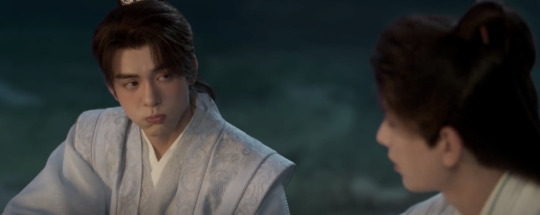

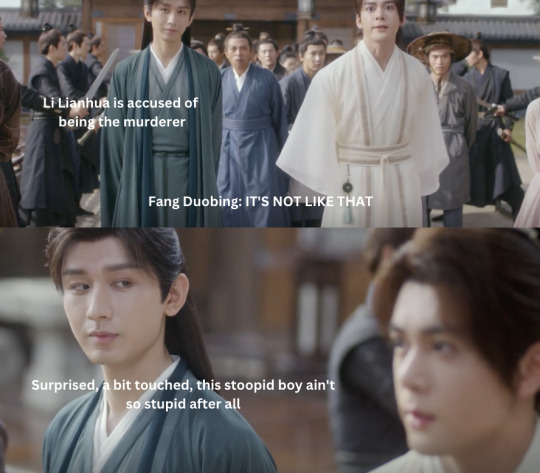
(3) Shifu Li Xiangyi not knowing he was shifu to Fang Duobing
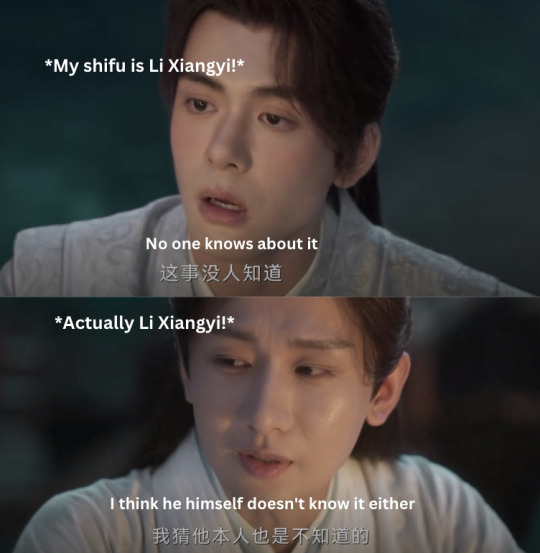
(4) Li Xiangyi being the reason for Fang Duobing to EXIST but Li Xiangyi ain’t around anymore (not) and he sad and Li Xiangyi can’t tell him who he is UWUUUU
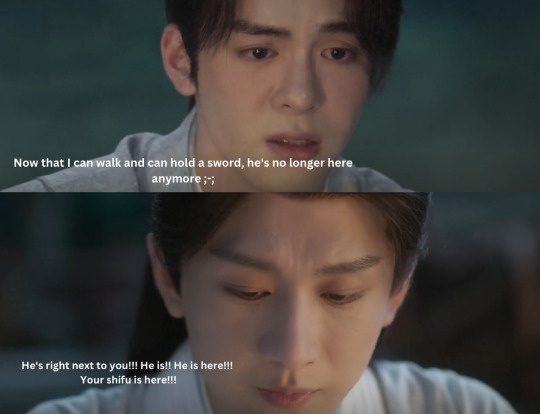
(5) Familiar faces hehe if you are a SNGX/The Blood of Youth and SHL fan
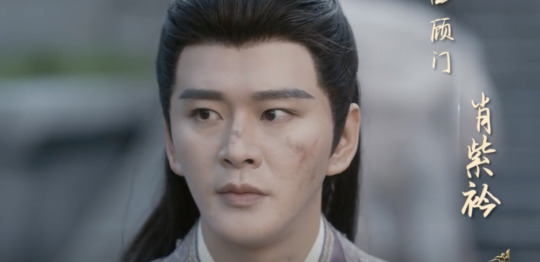

(6) CASES ARE INTERESTING!!!
819 notes
·
View notes
Text
The Gate of Broken Legs - 2HA Chapter 8
Meatbun makes a really punny joke in this line. XD
派中流传一段戏言:“水榭藏美人,美人诏天问。入我断腿门,知我断腿苦。玉衡长老,助您自绝经脉的不二选择。”
The sect disciples had an inside joke: “The pavilion hides a beauty; the beauty holds Tianwen. Enter through the Gate of Broken Legs and know the agony of getting your legs broken. If you want your meridians busted, look no further than the Yuheng Elder.” - 2HA Translation Chapter 8 This Venerable One Gets Punished
Again, let us admire how awesome Meatbun is because “入我断腿门,知我断腿苦 Enter through the Gate of Broken Legs and know the agony of getting your legs broken” is a pun off a Li Bai poem/ci. 😂. And the line is hilarious af once you’ve read the original verse HAHA.
The original line comes from the lovey dovey ci “Autumn wind.” Omg I felt like I ate too much sugar after translating this.
秋风词 | Autumn Wind Ci
秋风清,秋月明,落叶聚还散,寒鸦栖复惊。
The autumn wind is desolate, the moon shines so radiantly. Scattered are the fallen leaves; even the crows perched on the trees are startled.
相亲相见知何日,此时此夜难为情;
Thinking back on the times where we met lovingly that day; my heart is troubled on this autumn night.
入我相思门,知我相思苦,
I walk through the door of lovesickness, and I know the agony of lovesickness.
(Meatbun swapped lovesick with broken legs LOL WTF HAHA I CAN’T)
长相思兮长相忆,短相思兮无穷极,
Lengthen lovesickness and memories for eternity; the shortened love sickness also goes without end
早知如此绊人心,何如当初莫相识
If I knew how it would entangle my heart, it would be better not to know one another in the first place.
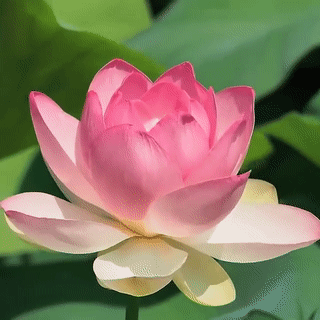
32 notes
·
View notes
Text
The Calligraphy in Su Manor 苏宅书法
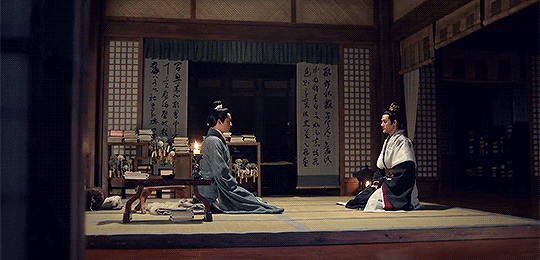
Calligraphy is one of the highest Chinese art forms, and displaying calligraphy in your house is a common thing to do whether you’re an ancient scholar or modern Chinese person with disposable income. As both art and writing, calligraphy simultaneously expresses the meaning of its text and the spirit of the one wielding the brush; as decoration, it imbues the surrounding space with its style and helps you project a certain image of yourself to visitors. Let’s take a close look at all the Su Manor calligraphy in Nirvana in Fire.
Though the calligraphy shown above is probably the most memorable, there are actually a total of five pairs (ten total) of hanging scrolls of calligraphy in the main room of Su Manor, plus the entrance calligraphy to your right as you enter. Here’s a floor plan of the room that I’ve redrawn based on a Chinese fan-made floorplan to highlight where the calligraphy are located, pair A being the main pair (arrows indicate the side you view them from):

Let’s start with the simplest, the four-character entrance calligraphy mounted to the wall, as seen here in wide view relative to the right scroll of Pair A and as a close-up:
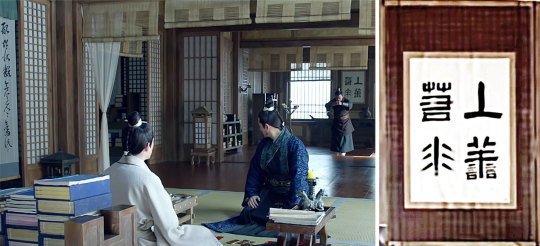
If you’re unfamiliar with ancient Chinese writing, it’s read top-to-bottom then right-to-left (Mainland China writing is nearly all left-to-right, top-to-down now, while Taiwanese and Hong Kong print are still mostly in the original orientation). These four characters, 上善若水, is a quote from Laozi, the founder of Daoism, in the foundational text Dao De Jing. The literal meaning is “Water is the highest form of being.” This is meant as an adage for how one should conduct oneself. The next few lines in the Dao De Jing explains it further: water provides for every living thing but doesn’t fight with any; water settles in places disliked by people, so it is close to the way of Dao. One should strive to be like water, content to be humble, to be of reserved character, to be kind to your friends, to speak as honestly as water is, to govern as orderly as water flows, to be as capable as water is, and to wait for the correct opportunity to make one’s move, like water. Only those who are non-confrontational like water will be free of worries (水善利万物而不争,处众人之所恶,故几于道。居善地,心善渊,与善仁,言善信,政善治,事善能,动善时。夫唯不争,故无尤). Mei Changsu is projecting an image of himself as a scholar striving toward Daoist and Confucian ideals, so it definitely makes sense that he would have something like this on his wall (not saying that he wasn’t actually striving for some of those ideals himself, either, but that’s more of a topic for another time).
Now, for the writing itself. This is a good time to mention that there are multiple distinct scripts in Chinese history (more on this later), and these four characters are written in a hybrid style borrowing from seal script (篆书; seal meaning engraving and not the animal) and clerical script (隶书), two of the oldest styles after the very ancient oracle bones script. During the Northern and Southern Dynasties, which NiF is loosely set in, seal script had already been largely reduced to ceremonial and decorative purposes (like all the overhead building signs you see in the show), and clerical script was a popular style of writing (many street banners and writing samples in the show were in this).
So here are the four characters compared to typical seal and clerical script characters from fonts (I say typical because these renderings have been popularized enough to become standard font sets in these scripts, but there are many variations and no one “true” way to write these characters), plus real samples of ancient handwriting that show some of the many extant variants:
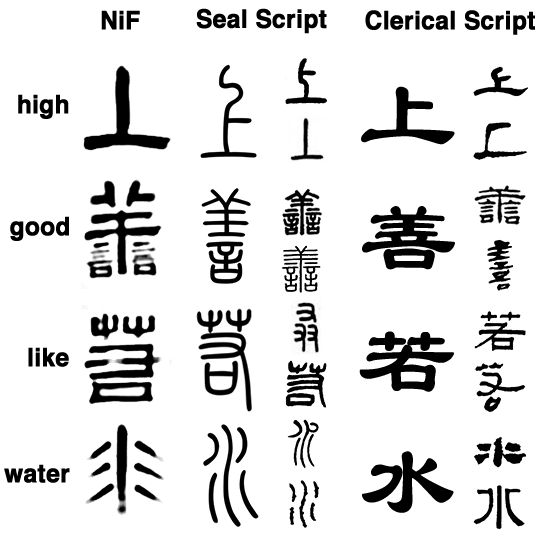
These samples are from shufa.supfree.net and humanum.arts.cuhk.edu.hk/Lexis/lexi-mf, two great sites for ancient calligraphy. Some things to note:
Good/善 and water/水 are relatively closer to clerical script while the other two characters are closer to seal script, but because clerical script evolved from seal script, there is a lot of overlap in its early forms with seal script, and the transition isn’t sharply defined.
Clerical script looks so much wider and shorter than seal script (and other scripts, too): that’s not me stretching pictures for no good reason—a popular explanation is that it was due to clerical script originating from writing seal script quickly with a brush on bamboo slips, and the texture of bamboo fibers led to the distinctive head and tails of the horizontal strokes as well as shorter vertical strokes.
Though I’m by no means an expert, I agree with the author of an excellent blog post on NiF calligraphy [1] that this calligraphy really doesn’t look very good. The strokes are crooked and sloppy in unsatisfying ways and the widths vary for no apparent reason. They’re neither like standard clerical script strokes, with the classic rounded and strong head and tapering flared tail (蚕头雁尾), nor standard seal script strokes, which should be balanced and of uniform width and strength. Most of the real samples look noticeably better to me.
Of course, rules are made to be broken, but when you’ve seen enough you get a sense of what’s convincing as a personal style, and what’s not. I have to imagine that Feiliu wrote this while Mei Changsu held his hand or something, and maybe that’s why Su-gege would prominently display this writing.
Keep reading
633 notes
·
View notes
Text
Shura Field, Red Lotus Waterside Pavilion - 2HA Chapter 8
但是红莲水榭是什么地方?是楚晚宁那孙子的居所,人称红莲地狱的修罗场。
But just what kind of place was the Red Lotus Pavilion? It was the residence of that bastard, Chu Wanning, the accursed den that everyone called Red Lotus Hell. - 2HA Translation Chapter 8: This Venerable One Gets Punished
Wow I was working on another meta, when I read this. AND LO AND BEHOLD MAJOR ERRORS LOL. (what's new lmao)
I just had to critique this translation because it’s just not accurate lol. To be exact it should be “It is the residence of that bastard (那孙子 - a Beijing slang fyi) Chu Wanning, otherwise known as the Shura Field of the Red Lotus Hell”. There’s no mention of it being an accursed den. IMHO, the official translation does erase a whole meta without bothering to explain it, so I can't say I’m terribly impressed lol.
So what exactly is a “Shura Field”?
Firstly, Shura, sometimes known as Asura, is a titan/demigod in Buddhism/Hinduism. The “Shura Fields” refers to the battlefield where the Emperor Shitian and Asura fought in Buddhist scriptures. So this term refers to a bloody battlefield. There’s also a second, more modern meaning, which refers to the complexity of interpersonal relationships (often used in a romantic sense in romantic novels or office politics lmao). It isn’t wrong to describe their romance as a “Shura Field”. If anyone’s interested, there’s a whole thread on Reddit discussing how commonly used this phrase is.
I do wonder if Meatbun used this term deliberately as a form of foreshadowing lol. Ranwan's romance IS a whole ass “Shura Field”.
They are depicted like this in ancient sculptures.
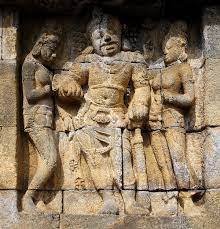
There are several reason why it’s wrong to term an Asura as a devil
Firstly, when translating a devil from CN>ENG, conventionally it would refer to the term 魔 Mo (ie. the same Mo in MDZS). This term takes its roots from Mara, which is a different entity altogether.
It does change the vibe of the sentence. In the CN novel context, Asura’s usually refer to something akin to God of War as opposed to being entirely demonic and evil. They’re more Ares than Hades to put it this way. So the line isn't saying that Chu Wanning is evil per se.
It’s also disrespectful given that Buddhisim and Hinduism are active religions in Asia Pacific. Hinduism is the largest religion in Asia FYI. Rude af to change the terminology of other religions.
It does have a pre-existing English term. Use it lmao. Even MTL gets it right.
There’s also an interesting meta around “Red Lotus Hell”. In Buddhism, the Red Lotus Hell is described as one of the “Eight Cold Hells.” It was said that those who were born into this hell are severely cold, their bodies turn red and their skin is frozen and cracked. (This does sound a little like Chu Wanning lmao). The idea of the Red Lotus Hell/Flame was also described in one of the scriptures of the Yehuo Sect “火焰化红莲,天罪自消衍 The flames turns into a red lotus, and the sins of Heaven fade on their own.” The flames refer to the “fire of trouble” and the lotus “a comfortable state of mind”. Hence, it means through (Buddhism) practice, karma can be eliminated, troubles can be relieved, and a state of freedom can be achieved.
The beautiful flower looks like this.
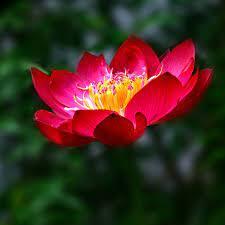
I’m not a Buddhist expert so correct me if I’m wrong lol. Anyway, if you combine the mental image of the Red Lotus Hall with that of Shura’s Field, you’d understand the vibe that Meatbun was going for.
On another note, 水榭 is quite specific to a type of Pavililon. It's not just any Pavillion, it's a pavillion that's beside a waterbody. There is another type of pavillion that's based on land, so if you want to be specific, this is how it probably looks like.
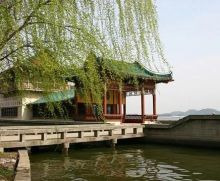
Additional links
More 2HA meta
20 notes
·
View notes
Text
"My heart has stilled" 2HA Meta (Chapter 2)
2HA’s a book that’s filled with literally references. I’ve always wanted to explain them all, but I couldn’t find the right medium to do so. Then along came the english translation and it made it a lot easier to use it as a basis to explain XD
As a matter of fact, did you know there’s a famous line at the start of Chapter 2? XD
“MY HEART HAS STILLED, and my thoughts turned to ash / Yet unexpectedly, the light of spring shines through the cold night. / Could it be that the heavens pity the blade of grass in the secluded valley? / Yet I fear that the world is unpredictable and full only of hardship.” - 2HA Chapter 2 This Venerable One Lives
This is actually a line from the Teochew Opera “Lady Mo Chou 莫愁女.” Lady Mo Chou was a dancer/singer born in the Chu State near the end of the Waring states. She was so good at her craft that the palace caught wind of it and the King of Chu kept her as a concubine. In the palace, she got to know a few people, one of which was Qu Yuan (I’ve talked about one of his works before lol.). Her dance and song was subsequently integrated into folk songs, and ultimately Chu ci.
This folk story was then made into an award winning Opera by the Nanjing Yue Opera Troupe in 1983. The opera is set in the the Yongle period (1403—1424) of the Ming Dynasty. Xu Cheng, the grandson of Xu Da (king of Zhongshan), loved Mo Chou the maid, who was tall and beautiful, and he poured out his love to her. Mo Chou was then moved by his pure feelings. Unexpectedly, Xu Cheng's grandmother forced betrothed her grandson to Qiu Caiyun, the prime minister's daughter. On the wedding night, the bride learns from the palace maids about the hidden love between Xu Cheng and Mo Chou. She tricks Mo Chou and gouges out her eyes, then drowns her in a lake. Xu Cheng was so angry that he jumped into the lake as well, resulting in a double tragedy.
If you want to experience what Moran was listening to (lmao the warbling), listen to 2:50-4:11
youtube
(obviously, Meatbun isn’t being historically accurate because this was song written in 1983 LOL) The song was also composed by He Zhanhao, the same dude who composed the famous Butterfly Lovers.
Additional links
More 2HA meta
18 notes
·
View notes
Text
I haven't been posting meta due to health issues but I might be restarting again soon.
Anyway, I missed a short MDZS meta in this poem. This is actually the same poem where Xiao Xingchen's name's derived from. Or rather, it's a pun. FYI, this is just one interpretation of his name. I might post the second interpretation if I have time. XD
I'd like to bring your attention to the second line in this poem
长河渐落晓(XIAO)星(XING)沉(CHEN) | The Milky Way makes its descent, and Venus/Morning Star starts to sink.
In the case of Xiao Xingchen, MXTX cleverly swaps 沉 chen for 尘 chen. Both words are pronounced the same way, but 尘 refers to the human world.
So if you pieced it together, his name likely means "Venus/Morning Star falls into the human realm." It's a pretty tragic name, if you ask me. :(.
Regret Peak 应悔峰 (Change E 嫦娥 by Li Shangyin 李商隐) - Thousand Autumns Meta
I'll be explaining Thousand Autumns on a chapter by chapter analysis. (idk how else to go about it lol). It'll be mostly on historical aspects that I found interesting. Personally, I haven't seen much discussion on the world building in Thousand Autumns but I think that's the most beautiful part of the novel!
The story starts off with two peaks; the Half Step/Banbu Peak and the Regret Peak. Essentially, the combatants fight on one peak (Half Step), and the spectators (Regret Peak) watch on another. I've previously talked about the Half Step Peak, but did you know that Regret Peak is based off a famous poem? XD
The “Regret Peak 应悔峰” comes from the Tang Dynasty poem “Chang E” written by Li Shangyin 李商隐. Chang E is known as the goddess of the moon, who drinks her husband (Houyi)’s elixir of immortality and flees to the moon.
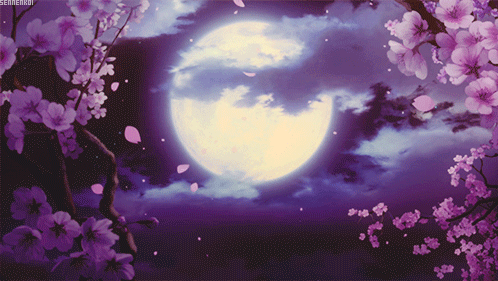
云母屏风烛影深,
The light from the candle light casts a thick shadow over the folding screen decorated with mica
This is how a folding screen looks like. In the past, these were decorated with mica stone.
长河渐落晓星沉。
The Milky Way makes its descent, and Venus starts to sink.
嫦娥应悔偷灵药,
Chang E must have regretted stealing the elixir.
碧海青天夜夜心。
Because now she’s alone with the blue sea, cerulean skies and the chill of the night.
Analysis - Thousand Autumns
So this is a poem that’s not just regretful but also very lonely. But to be precise, it’s the “Should be regretful” peak to account for the 应. So the first thing that struck me was, who SHOULD be regretful and lonely in thousand autumns? Notice that the poem does say that Chang E should be regretful but doesn’t really state if she IS. And is this person in thousand autumns even regretful of his actions? Is Yan Wushi or Shen Qiao regretful of their actions? Or should they even be regretful? It’s an intriguing choice of words.
Additional links:
Half Step Peak Meta
Thousand Autumns Meta
Poetry list
18 notes
·
View notes
Text
Support a translator of color!
This is an ongoing situation as of 2023.06.24.
My friend Yilin (she/they) does a lot (A LOT) of work translating literature from Chinese to English, among other things. And they allowed me to signal boost this on tumblr since she doesn't have one yet.
The beginning of the thread is here: https://twitter.com/yilinwriter/status/1670305203206385665 and all the tweet images below are not described because they are previews of direct links to the tweets.
Key points: The British Museum stole their translation work and used it, uncredited, in a major exhibit where they "appeared in photos on a giant display, on signage, in a physical guide, in a digital guide, in an audio guide, and in an app that is available for international download. How did NO ONE catch there was no credit?"

The response from the British Museum has been enormously disappointing so far:
"we will not be reinstating the translations in the exhibition that have been removed following your complaint, and therefore you will not be acknowledged in the exhibition as your work will not be featured" - except the uncredited translations are still in the 30,000 copies of the exhibition catalog.
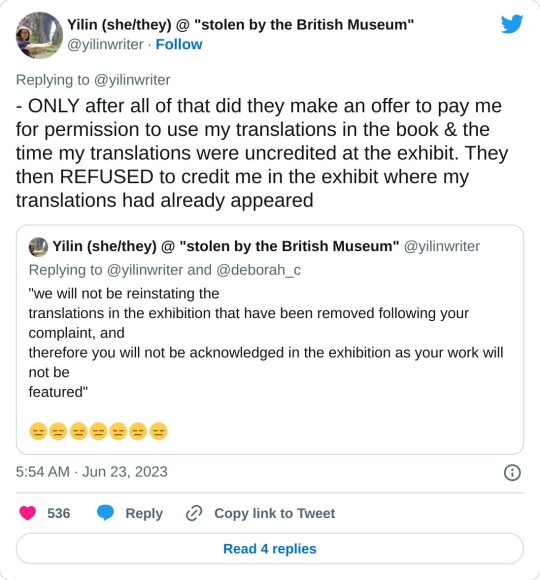
Go check out more updates downthread as the situation develops.
Want to support Yilin?

"If you want to write to them or have written to the BM, you can help convey these demands of mine to them: - credit + public apology everywhere the work appears - proper payment (increased to account for lack of prior permission given & all the time the work was uncredited)"
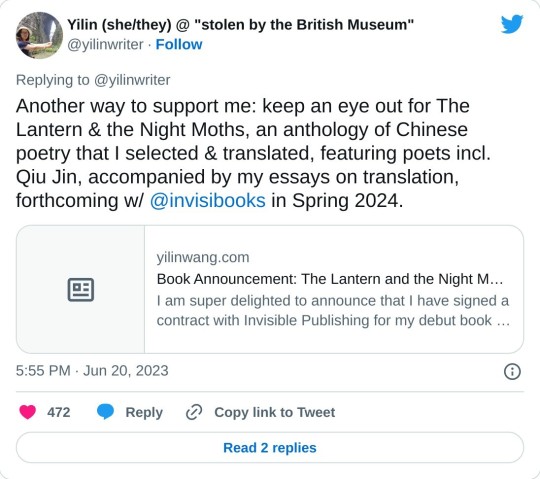
Boost Yilin's book! "The Lantern & the Night Moths, an anthology of Chinese poetry that I selected & translated, featuring poets incl. Qiu Jin, accompanied by my essays on translation, forthcoming w/ @/invisibooks in Spring 2024"
Yilin's page: https://yilinwang.com/book-announcement-the-lantern-and-the-night-moths/
and the pre-order link: https://invisiblepublishing.com/product/the-lantern-and-the-night-moths/
I'll try to update as more things happen, or you can go camp out on the thread.
1K notes
·
View notes
Text
There was no one at the ferry in the wilderness; save for a small boat that lies on the water leisurely. "野渡无人舟自横" - The meaning of Fei Du 费渡 and Luo Wenzhou 骆闻舟's Name. (Wei Yingwu 韦应物- Chuzhou’s Xijian 滁州西涧)
I’ve never analysed a priest related meta so here’s a first for me I guess.
It’s a known fact that Fei Du and Luo Wenzhou’s names were censored when the Modu adaptation was released. The names just stuck out to me so I did some research and WOW, their names were from the same line in a poem (OBVIOUSLY).
And it's a very famous poem too, which is probably why their names were changed because everyone knows what Priest was trying to imply.

So anyway here it goes ~
Their names arise from from Chuzhou’s Xijian 滁州西涧 written by the Tang Dynasty Poet Wei Yingwu 韦应物 (lmao this dude's courtesy name was Yibo XD) . Chuzhou’s a city located in the Anhui Province. 西涧 Xijian refers to a river located west of Chunzhou. When the poet was the governor of Chunzhou, he frequently visited Xijian and thus, it inspired him to write this poem. Wei Yingwu has a reputation for writing poetry based on scenery so here's one of them!
独怜幽草涧边生,上有黄鹂深树鸣。
The only thing I like is the lonely grass that grows by the stream that runs through the valley, and the orioles that cry out in the deep undergrowth.
T/N: 独怜 is a very interesting word. 😍. It can be broken down to 独 (unique, alone) and 怜 (pity, love). So in this case, most people would interpret this as something was so unique and the poet loved it, or it could also mean something that was lonely and pitiful 🥲
春潮带雨晚来急,野渡(DU)无人舟(ZHOU)自横。
In the evening, when the spring tide rises and the rain drizzles, the water in the Xijian river becomes increasingly turbulent. There was no one at the ferry in the wilderness; save for a small boat that lies on the water leisurely.
"野渡无人舟自横" is a very famous line (Tang 300!) and it has inspired many to draw based on this line alone.
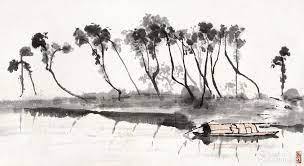
Drawn by Zhang Pin in 1963.
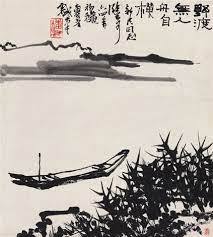
And another painting by Pan Tianshou in 1964
To fully understand this poem, we have to start from the poet’s background. Wei Yingwu came from a rich family, and when he was 15 years old, he was the aide of Emperor Xuanzhong. In the early days, he was unruly and the villagers under him suffered. During the An Lushan Rebellion, Xuanzhong fled and Wei Yingwu lost his job. Wei Yingwu then put his mind to studying and eventually, he became an official. It was said that his past turbulent experiences in his life (the An Lushan Rebellion in particular) inspired his poem.
As a bonus point, you’re absolutely right if you’ve read modu and found the vibe of this poem to be very familiar. Because Priest has used similar imagery throughout the novel. For example, in Chapter 95:
He was like a traveler walking through the desert, his body utterly broken. And Luo Wenzhou and this tiny house was like a bottle half filled with water that fell from the sky. Even if it contained arsenic, or if the cold broke apart his fingers one by one ... he could not give it up. - Translation by yours truly.
132 notes
·
View notes
Text
Yes many ancient poetries have been revamped into songs, even in modern times! Wen Kexing uses many song/poems 😍
Just adding on an extra tidbit, 2HA’s Chu Wanning’s Guqin and SNGX’s Luo Qingyang’s sword were also named after Jiu Ge 九歌.
"The numerous gods of the Mount Jiuyi have arrived, they arrive as plentiful as the clouds as they greet Lady Xiang. " "SHL Episode 9 - Qu Yuan's Cu Ci Nine Song九歌 Series Lady Xiang 湘夫人"
I deliberated for a long time as to whether I’d translate this poem. But this likely where Gu Xiang got her name from so I just had to do it. I thought this would be a simple poem but it took me more than a month to do it lol. XD
When native cn speakers come across a lady with the name Xiang 湘, it immediately brings to mind the two Xiang River Goddesses. They were said to be the concubine of the legendary Emperor Shun. “Lady Xiang 湘夫人” is a Pre Qin poem that’s written as part of Qu Yuan's Chu Ci Jiu Ge/Nine Song series, and it’s also known as the sister poem to “Xiang Jun 湘君”.
There are many interpretations as to who the focus of the story is. But for the sake of this translation, I’ll be working on the assumption that the poem is about Lady Xiang missing her husband (Emperor Shun). The poem’s really long and only the last part’s quoted in SHL, so feel free to skip to the end of the translation.
This poem's known its vibrant descriptions and there's a bunch of reference to specific plants which I've linked. If you ever intend to write a fic in the Chu dynasty, or a fic centered around the 700-200BC, you could use this as a visual reference. (yas my nerdy friends, historical accuracy is sexy)
帝子降兮北渚,目眇眇兮愁予。
Lady Xiang has arrived at the Northern Island, my gaze is filled with sadness and worry.
北渚: This was likely referring to 君山岛 Junshan Island. There's a lot of historical sites if you ever want to go there!
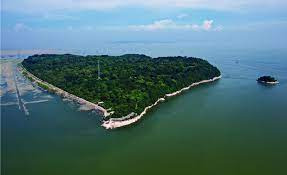
袅袅兮秋风,洞庭波兮木叶下。
The autumn wind blows gently endlessly; the Dongting lake ripples, the leaves fall.
登白薠兮骋望,与佳期兮夕张。
Standing amidst the reeds as I gaze into the distance, anticipating the date with the lover tonight.

鸟何萃兮蘋中,罾何为兮木上?
Why do the birds gather amongst the reeds? Why are the fishnets on the tops of the trees?
This line implies that the birds should be in the trees, and the fishnets among the aquatic reeds. But yet the situation’s the reverse. (Ie. what should have happened has t happened.). It describes the author’s uneasy feelings.
T/N: Just in case anyone’s as nerdy as me, this is likely a mirror of the line “采薜荔兮水中,搴芙蓉兮木末 I want to pick the scallops in the water, and to pluck the lotus from the trees” in sister poem in the same series, 湘君 Xiang Jun.
And look, more pictures of plants! (yes it's a different reed xD)

沅有芷兮澧有兰,思公子兮未敢言。
Th flower from the ginseng plant in the River Yuan, and orchids in the Lishui River. I can’t describe how much I miss you, Young Master (Gongzi).
T/N: Interestingly, 公子 Gongzi (aka Young Master) could be used on both male and female in the past. This is a very interesting point because there’s actually a huge debate as to who’s the poem is referring to. Baidu has interpreted this to mean Miss Xiang (ie. the goddess), but on the contrary, one physical book (yes I take this seriously lmao) I’ve bought thinks this is referring to Xiang Jun (the subject in her sister poem, and possibly her husband), and another physical book refrains from nailing the subject down. So who knows LOL.
And just how gorgeous is the ginseng flower!
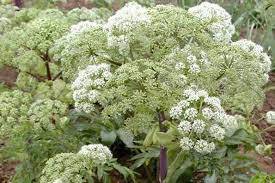
荒忽兮远望,观流水兮潺湲。
My emotions are unsettled, I gaze towards the distance with uncertainty. However, the River Yuan and Lishui flows slowly.
麋何食兮庭中?蛟何为兮水裔?
Why does the deer seek food in the courtyard? Why do the dragon (jiaolong) trapped on the river bank?
T/N: 麋: This term actually refers to the deer, but it has been described as “antlers like a deer, tail of a donkey, hooves of a cow, face of a horse” in ancient times, so it’s sometimes regarded as the mythological creature 四不像 (Si Buxiang/Four not alike). It has made an appearance in some anime, and in one particular danmei fandom’s discourse. LOL
The mythological version is supposed to look like this. XD

蛟: Jialong refers to the “scaled dragon” in chinese mythology. If you’ve been watching Till the End of the Moon, Mingye was a jialong whom cultivated and became an immortal.

朝驰余马兮江皋,夕济兮西澨。
When morning comes, I ride my horse and race down the river bank. I cross over to the western bank at night.
闻佳人兮召予,将腾驾兮偕逝。
I hear my lover summons me. So I speed towards hastily and we head off together.
筑室兮水中,葺之兮荷盖。
We build our house in the water, and cover our roof with lotus leaves.
荪壁兮紫坛,播芳椒兮成堂。
The walls are decorated with moss, and purple shells pave the floor. The fragrant pepper and dirt we mould form the family’s prayer hall.
T/N: 芳椒 - This was a specific type of fragrant pepper. This was mixed with mud and painted on the walls, as the ancient people enjoyed its aroma. The moss refers to this specifically!
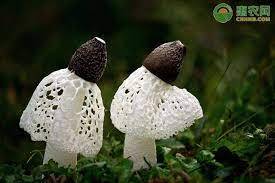
桂栋兮兰橑,辛夷楣兮药房。
The wood of the Gui tree form the beams, the Magnolia forms the rafters. The crossbeams of the door are made from wood of the Xinyi tree, the white ginseng flowers decorates the medicinal room.
T/N: 辛夷 - The Xinyi tree is also part of the magnolia family. There's clearly a theme going on!
The Gui tree's so pretty! And the white magnolias!
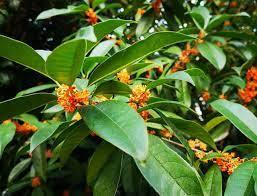
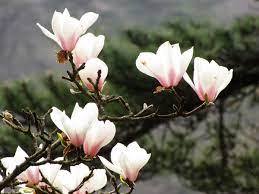
And the Xinyi tree

罔薜荔兮为帷,擗蕙櫋兮既张。
The climbing fig is woven into a curtains, and the partitions made of flowers have been drawn.
T/N: 薜荔: Baidu says it’s the climbing fig, but my physical book thinks it’s the another magnolia plant. And the 蕙 flower was known for its fragrance.
Baidu's interpretation!

And my book's interpretation XD

And look, the pretty 蕙 flower!

白玉兮为镇,疏石兰兮为芳。
The weights are made of snowy white jade, the fragrance of orchards permeates the air.
T/N: The 镇 Weights were similar to paper weights, and were used to keep mats/clothes in their place. It originated from the Qin and Han Dynasty, whereby people used to keep the mat in place (to prevent it from moving around when they got up). Sometimes, it'll be in the shape of an animal, like a lion for example.
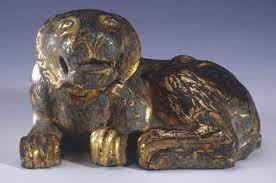
芳: Another interesting point; Baidu interprets this as fragrance, but the physical book thinks it means to block off the wind from the head of the bed. 芳 is sometimes interpreted as 防 (to block in some ancient text)
芷葺兮荷屋,缭之兮杜衡。
The lotus form the house, and the ginseng flowers form the roof. It’s scent intermingles with that of the wild ginger
And this is how wild ginger looks like!

合百草兮实庭,建芳馨兮庑门。
We gather various kinds of flowers and plants to fill the courtyard, and we’ve build a fragrant porch.
九嶷缤兮并迎,灵之来兮如云。 (The line that's in SHL)
The numerous gods of the Mount Jiuyi have arrived, they arrive as plentiful as the clouds as they greet Lady Xiang.
T/N: 九嶷: Jiuyi mountain was the legendary burial place of the legendary Emperor Shun. It’s a mountain range in Hunan Province, located at the south of the river Xiang 湘水南.
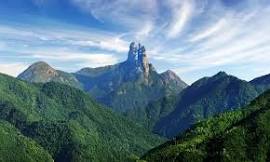
捐余袂兮江中,遗余褋兮澧浦。
I throw my outer garment into the river. And I throw my inner undergarment into the Lishui.
搴汀洲兮杜若,将以遗兮远者。
Arriving at the island’s river bank, I pluck the flowers as I eagerly await for my lover.

时不可兮骤得,聊逍遥兮容与。
Good times won’t return once it has passed. I’ll travel leisurely as I wander freely.
47 notes
·
View notes
Text
Omg I didn’t notice it but now that you’ve brought it up 🤔🤔
"The numerous gods of the Mount Jiuyi have arrived, they arrive as plentiful as the clouds as they greet Lady Xiang. " "SHL Episode 9 - Qu Yuan's Cu Ci Nine Song九歌 Series Lady Xiang 湘夫人"
I deliberated for a long time as to whether I’d translate this poem. But this likely where Gu Xiang got her name from so I just had to do it. I thought this would be a simple poem but it took me more than a month to do it lol. XD
When native cn speakers come across a lady with the name Xiang 湘, it immediately brings to mind the two Xiang River Goddesses. They were said to be the concubine of the legendary Emperor Shun. “Lady Xiang 湘夫人” is a Pre Qin poem that’s written as part of Qu Yuan's Chu Ci Jiu Ge/Nine Song series, and it’s also known as the sister poem to “Xiang Jun 湘君”.
There are many interpretations as to who the focus of the story is. But for the sake of this translation, I’ll be working on the assumption that the poem is about Lady Xiang missing her husband (Emperor Shun). The poem’s really long and only the last part’s quoted in SHL, so feel free to skip to the end of the translation.
This poem's known its vibrant descriptions and there's a bunch of reference to specific plants which I've linked. If you ever intend to write a fic in the Chu dynasty, or a fic centered around the 700-200BC, you could use this as a visual reference. (yas my nerdy friends, historical accuracy is sexy)
帝子降兮北渚,目眇眇兮愁予。
Lady Xiang has arrived at the Northern Island, my gaze is filled with sadness and worry.
北渚: This was likely referring to 君山岛 Junshan Island. There's a lot of historical sites if you ever want to go there!

袅袅兮秋风,洞庭波兮木叶下。
The autumn wind blows gently endlessly; the Dongting lake ripples, the leaves fall.
登白薠兮骋望,与佳期兮夕张。
Standing amidst the reeds as I gaze into the distance, anticipating the date with the lover tonight.

鸟何萃兮蘋中,罾何为兮木上?
Why do the birds gather amongst the reeds? Why are the fishnets on the tops of the trees?
This line implies that the birds should be in the trees, and the fishnets among the aquatic reeds. But yet the situation’s the reverse. (Ie. what should have happened has t happened.). It describes the author’s uneasy feelings.
T/N: Just in case anyone’s as nerdy as me, this is likely a mirror of the line “采薜荔兮水中,搴芙蓉兮木末 I want to pick the scallops in the water, and to pluck the lotus from the trees” in sister poem in the same series, 湘君 Xiang Jun.
And look, more pictures of plants! (yes it's a different reed xD)

沅有芷兮澧有兰,思公子兮未敢言。
Th flower from the ginseng plant in the River Yuan, and orchids in the Lishui River. I can’t describe how much I miss you, Young Master (Gongzi).
T/N: Interestingly, 公子 Gongzi (aka Young Master) could be used on both male and female in the past. This is a very interesting point because there’s actually a huge debate as to who’s the poem is referring to. Baidu has interpreted this to mean Miss Xiang (ie. the goddess), but on the contrary, one physical book (yes I take this seriously lmao) I’ve bought thinks this is referring to Xiang Jun (the subject in her sister poem, and possibly her husband), and another physical book refrains from nailing the subject down. So who knows LOL.
And just how gorgeous is the ginseng flower!

荒忽兮远望,观流水兮潺湲。
My emotions are unsettled, I gaze towards the distance with uncertainty. However, the River Yuan and Lishui flows slowly.
麋何食兮庭中?蛟何为兮水裔?
Why does the deer seek food in the courtyard? Why do the dragon (jiaolong) trapped on the river bank?
T/N: 麋: This term actually refers to the deer, but it has been described as “antlers like a deer, tail of a donkey, hooves of a cow, face of a horse” in ancient times, so it’s sometimes regarded as the mythological creature 四不像 (Si Buxiang/Four not alike). It has made an appearance in some anime, and in one particular danmei fandom’s discourse. LOL
The mythological version is supposed to look like this. XD

蛟: Jialong refers to the “scaled dragon” in chinese mythology. If you’ve been watching Till the End of the Moon, Mingye was a jialong whom cultivated and became an immortal.

朝驰余马兮江皋,夕济兮西澨。
When morning comes, I ride my horse and race down the river bank. I cross over to the western bank at night.
闻佳人兮召予,将腾驾兮偕逝。
I hear my lover summons me. So I speed towards hastily and we head off together.
筑室兮水中,葺之兮荷盖。
We build our house in the water, and cover our roof with lotus leaves.
荪壁兮紫坛,播芳椒兮成堂。
The walls are decorated with moss, and purple shells pave the floor. The fragrant pepper and dirt we mould form the family’s prayer hall.
T/N: 芳椒 - This was a specific type of fragrant pepper. This was mixed with mud and painted on the walls, as the ancient people enjoyed its aroma. The moss refers to this specifically!

桂栋兮兰橑,辛夷楣兮药房。
The wood of the Gui tree form the beams, the Magnolia forms the rafters. The crossbeams of the door are made from wood of the Xinyi tree, the white ginseng flowers decorates the medicinal room.
T/N: 辛夷 - The Xinyi tree is also part of the magnolia family. There's clearly a theme going on!
The Gui tree's so pretty! And the white magnolias!


And the Xinyi tree

罔薜荔兮为帷,擗蕙櫋兮既张。
The climbing fig is woven into a curtains, and the partitions made of flowers have been drawn.
T/N: 薜荔: Baidu says it’s the climbing fig, but my physical book thinks it’s the another magnolia plant. And the 蕙 flower was known for its fragrance.
Baidu's interpretation!

And my book's interpretation XD

And look, the pretty 蕙 flower!

白玉兮为镇,疏石兰兮为芳。
The weights are made of snowy white jade, the fragrance of orchards permeates the air.
T/N: The 镇 Weights were similar to paper weights, and were used to keep mats/clothes in their place. It originated from the Qin and Han Dynasty, whereby people used to keep the mat in place (to prevent it from moving around when they got up). Sometimes, it'll be in the shape of an animal, like a lion for example.

芳: Another interesting point; Baidu interprets this as fragrance, but the physical book thinks it means to block off the wind from the head of the bed. 芳 is sometimes interpreted as 防 (to block in some ancient text)
芷葺兮荷屋,缭之兮杜衡。
The lotus form the house, and the ginseng flowers form the roof. It’s scent intermingles with that of the wild ginger
And this is how wild ginger looks like!

合百草兮实庭,建芳馨兮庑门。
We gather various kinds of flowers and plants to fill the courtyard, and we’ve build a fragrant porch.
九嶷缤兮并迎,灵之来兮如云。 (The line that's in SHL)
The numerous gods of the Mount Jiuyi have arrived, they arrive as plentiful as the clouds as they greet Lady Xiang.
T/N: 九嶷: Jiuyi mountain was the legendary burial place of the legendary Emperor Shun. It’s a mountain range in Hunan Province, located at the south of the river Xiang 湘水南.

捐余袂兮江中,遗余褋兮澧浦。
I throw my outer garment into the river. And I throw my inner undergarment into the Lishui.
搴汀洲兮杜若,将以遗兮远者。
Arriving at the island’s river bank, I pluck the flowers as I eagerly await for my lover.

时不可兮骤得,聊逍遥兮容与。
Good times won’t return once it has passed. I’ll travel leisurely as I wander freely.
47 notes
·
View notes
Text
for modern AU fics - what chinese media did diaspora consume?
making this post because some of us in the diaspora server were having a chat about what Chinese media "Diaspora Chinese" watched in the 90's - 2000's (and even sooner than that) while not having access to satellite chinese media or streaming services - this is in the context of writing modern AU fics based off Chinese media/novels (so your main character's grandpa or uncle is not, in fact, watching an episode of Friends or Shortland Street or something as flavour text because sorry what the hell-)
We generally watched a lot of stuff on VCDs, including bootlegged and non-bootlegged movies, shows, anime/donghua. My household had a whole VCD album of this, and a lot of VCDs (even if they were pirated editions) would have a fancy hardcover box with a magnetic clasp and some artwork representing the show on it.
All of this is Mandarin - so not TVB stuff, because I'm from Northern China and I don't know any cantonese - but Canto friends, please feel free to add to the list! This is mostly stuff my parents liked to watch, or I liked to watch with them, with the exception of a few which I mainly watched with friends/cousins when I was maybe twelve years old onwards. This is a pretty personal list, meant to give people general idea of a possible "ballpark" of sorts, and by no means exhaustive.
Now, for the list of shows which I can confirm I had or someone I know had on VCD or some kind of offline media format lol (I'll try add release year stamps and links to the EN wikipedia where possible):
Period dramas (mostly Qing Dynasty stuff):
Huan Zhu Gege 还珠格格 (1998, April-) This is a classic, so many memes come from this show; hugely popular series, basically cemented Zhang Tie Lin's face as the face of the Qing Emperor for about a decade.
Tie Chi Tong Ya Ji Xiao Lan 铁齿铜牙纪晓岚 (2002-2010) - I loved this show as a kid and watched all four seasons on repeat with family... The "trio" in this show are well known and loved.
Amazing Detective Di Ren Jie / 神探狄仁杰 (2004) A very popular and addictive show.
Ok now the Big Four:
Romance of 3 kingdoms 1994 / 三国演义 (1994) - a classic that has had many remakes, my older cousin would play this on repeat...
Hong Lou Meng/红楼梦 (1987) - another classic with many remakes, but I think the most recognised by the public one is the 1987 one.
Journey to the West / 西游记 live action (1986) - I think the 1986 version of the live action is the most recognised one.
*Shui Hu Zhuan / 水浒传 (1998) - I am not too familliar with the live action of this one in my household tbh bc my mum doesn't like it lol (she keeps saying it's too depressing) but I'm sure it's up there with the rest of the big four, if anyone has an opinion on this one please let me know!
Modern setting shows:
My dad loved all the Sun Honglei (孙红雷 - actor name) stuff, iirc it was a lot of MinGuo period espionage stuff, your shanghai 1920's sxc aesthetic. This actor has been around since 1999? Qian Fu (潜伏)was very famous, and Ren Jian Zheng Dao Shi Cang Sang (人间正道是沧桑)。 These were around '08 and '09.
Chuang Guan Dong - 闯关东 (2008) (Baidu link, sorry - couldn't get an EN wikipedia one). This show was huge when it was airing, everyone was watching it. I was pretty young but even I watched it and got invested ... and I thought it was such an "old person" show at the time lmao.
Xiao Bing Zhang Ga / 小兵张嘎 (2004) (sorry, again Baidu link) - yo, anti-japanese war movies set between 1937-1945 were crazy popular - this is one of them and was very popular):
Donghua/Anime (all the stuff kid me watched and some which I didn't but were popular):
喜羊羊与灰太狼 (2005-)
Calabash Brothers / 葫芦兄弟 (1986-1987)
Black Cat Detective / Hei Mao Jing Zhang 黑猫警长 (1984-2010)
Lan Mao Tao Qi 3000 Wen 蓝蓝猫淘气3000问 AKA 蓝猫 (blue cat) (October 1999 - Present)
Legend of Ne Zha 哪吒传奇 (2003)
Journey to the West/Xi You Ji 西游记 This was truly the Donghua I grew up on, the OP song and ED song are classic bangers all kids know.
Slam Dunk/ 灌篮高手 - People truly watched a lot of anime that may or may not have been terribly dubbed into mando (possibly canto too). Late 80s and 90s kids were all over this, and Dragon Ball.
Taiwanese Dramas:
This is mid-late 2000's, I would be remiss to not talk about the Taiwanese dramas of this era. Mike He, Rainie Yang, Wu Zun (amongst many, many others) were huge. Stuff like Dou Niu Yao Bu Yao, it started with a kiss, Hua Yang Shao Nv (Taiwanese version of Hana Kimi) were all pretty popular. Not sure if these shows all hold up in 2023, but boy were they popular at the time.
Note about CNY:
For CNY, people would try to tune into 春节联欢晚会 (the CCTV official CNY show) at that One Friend Who Had China Satellite TV's house. Zhao Ben Shan / 赵本山 was a comedy staple, and the show would often feature people from the music industry to perform. Eventually these people became more and more relevant to my gen and Jay Chou etc started appearing.
Last but not least Xian Jiaaaan 仙剑:
In 2005 I was all over 仙剑奇侠传 (Chinese Paladin), based off the video game. This show was crazy popular and probably sent me and a whole lot of other kids into Xianxia / Wuxia hell (and Hu Ge hell, and later I came back to love Liu Yifei). Thank you. The OST is a true banger.
143 notes
·
View notes
Text
"The numerous gods of the Mount Jiuyi have arrived, they arrive as plentiful as the clouds as they greet Lady Xiang. " "SHL Episode 9 - Qu Yuan's Cu Ci Nine Song九歌 Series Lady Xiang 湘夫人"
I deliberated for a long time as to whether I’d translate this poem. But this likely where Gu Xiang got her name from so I just had to do it. I thought this would be a simple poem but it took me more than a month to do it lol. XD
When native cn speakers come across a lady with the name Xiang 湘, it immediately brings to mind the two Xiang River Goddesses. They were said to be the concubine of the legendary Emperor Shun. “Lady Xiang 湘夫人” is a Pre Qin poem that’s written as part of Qu Yuan's Chu Ci Jiu Ge/Nine Song series, and it’s also known as the sister poem to “Xiang Jun 湘君”.
There are many interpretations as to who the focus of the story is. But for the sake of this translation, I’ll be working on the assumption that the poem is about Lady Xiang missing her husband (Emperor Shun). The poem’s really long and only the last part’s quoted in SHL, so feel free to skip to the end of the translation.
This poem's known its vibrant descriptions and there's a bunch of reference to specific plants which I've linked. If you ever intend to write a fic in the Chu dynasty, or a fic centered around the 700-200BC, you could use this as a visual reference. (yas my nerdy friends, historical accuracy is sexy)
帝子降兮北渚,目眇眇兮愁予。
Lady Xiang has arrived at the Northern Island, my gaze is filled with sadness and worry.
北渚: This was likely referring to 君山岛 Junshan Island. There's a lot of historical sites if you ever want to go there!

袅袅兮秋风,洞庭波兮木叶下。
The autumn wind blows gently endlessly; the Dongting lake ripples, the leaves fall.
登白薠兮骋望,与佳期兮夕张。
Standing amidst the reeds as I gaze into the distance, anticipating the date with the lover tonight.

鸟何萃兮蘋中,罾何为兮木上?
Why do the birds gather amongst the reeds? Why are the fishnets on the tops of the trees?
This line implies that the birds should be in the trees, and the fishnets among the aquatic reeds. But yet the situation’s the reverse. (Ie. what should have happened has t happened.). It describes the author’s uneasy feelings.
T/N: Just in case anyone’s as nerdy as me, this is likely a mirror of the line “采薜荔兮水中,搴芙蓉兮木末 I want to pick the scallops in the water, and to pluck the lotus from the trees” in sister poem in the same series, 湘君 Xiang Jun.
And look, more pictures of plants! (yes it's a different reed xD)

沅有芷兮澧有兰,思公子兮未敢言。
Th flower from the ginseng plant in the River Yuan, and orchids in the Lishui River. I can’t describe how much I miss you, Young Master (Gongzi).
T/N: Interestingly, 公子 Gongzi (aka Young Master) could be used on both male and female in the past. This is a very interesting point because there’s actually a huge debate as to who’s the poem is referring to. Baidu has interpreted this to mean Miss Xiang (ie. the goddess), but on the contrary, one physical book (yes I take this seriously lmao) I’ve bought thinks this is referring to Xiang Jun (the subject in her sister poem, and possibly her husband), and another physical book refrains from nailing the subject down. So who knows LOL.
And just how gorgeous is the ginseng flower!

荒忽兮远望,观流水兮潺湲。
My emotions are unsettled, I gaze towards the distance with uncertainty. However, the River Yuan and Lishui flows slowly.
麋何食兮庭中?蛟何为兮水裔?
Why does the deer seek food in the courtyard? Why do the dragon (jiaolong) trapped on the river bank?
T/N: 麋: This term actually refers to the deer, but it has been described as “antlers like a deer, tail of a donkey, hooves of a cow, face of a horse” in ancient times, so it’s sometimes regarded as the mythological creature 四不像 (Si Buxiang/Four not alike). It has made an appearance in some anime, and in one particular danmei fandom’s discourse. LOL
The mythological version is supposed to look like this. XD

蛟: Jialong refers to the “scaled dragon” in chinese mythology. If you’ve been watching Till the End of the Moon, Mingye was a jialong whom cultivated and became an immortal.

朝驰余马兮江皋,夕济兮西澨。
When morning comes, I ride my horse and race down the river bank. I cross over to the western bank at night.
闻佳人兮召予,将腾驾兮偕逝。
I hear my lover summons me. So I speed towards hastily and we head off together.
筑室兮水中,葺之兮荷盖。
We build our house in the water, and cover our roof with lotus leaves.
荪壁兮紫坛,播芳椒兮成堂。
The walls are decorated with moss, and purple shells pave the floor. The fragrant pepper and dirt we mould form the family’s prayer hall.
T/N: 芳椒 - This was a specific type of fragrant pepper. This was mixed with mud and painted on the walls, as the ancient people enjoyed its aroma. The moss refers to this specifically!

桂栋兮兰橑,辛夷楣兮药房。
The wood of the Gui tree form the beams, the Magnolia forms the rafters. The crossbeams of the door are made from wood of the Xinyi tree, the white ginseng flowers decorates the medicinal room.
T/N: 辛夷 - The Xinyi tree is also part of the magnolia family. There's clearly a theme going on!
The Gui tree's so pretty! And the white magnolias!


And the Xinyi tree

罔薜荔兮为帷,擗蕙櫋兮既张。
The climbing fig is woven into a curtains, and the partitions made of flowers have been drawn.
T/N: 薜荔: Baidu says it’s the climbing fig, but my physical book thinks it’s the another magnolia plant. And the 蕙 flower was known for its fragrance.
Baidu's interpretation!

And my book's interpretation XD

And look, the pretty 蕙 flower!

白玉兮为镇,疏石兰兮为芳。
The weights are made of snowy white jade, the fragrance of orchards permeates the air.
T/N: The 镇 Weights were similar to paper weights, and were used to keep mats/clothes in their place. It originated from the Qin and Han Dynasty, whereby people used to keep the mat in place (to prevent it from moving around when they got up). Sometimes, it'll be in the shape of an animal, like a lion for example.

芳: Another interesting point; Baidu interprets this as fragrance, but the physical book thinks it means to block off the wind from the head of the bed. 芳 is sometimes interpreted as 防 (to block in some ancient text)
芷葺兮荷屋,缭之兮杜衡。
The lotus form the house, and the ginseng flowers form the roof. It’s scent intermingles with that of the wild ginger
And this is how wild ginger looks like!

合百草兮实庭,建芳馨兮庑门。
We gather various kinds of flowers and plants to fill the courtyard, and we’ve build a fragrant porch.
九嶷缤兮并迎,灵之来兮如云。 (The line that's in SHL)
The numerous gods of the Mount Jiuyi have arrived, they arrive as plentiful as the clouds as they greet Lady Xiang.
T/N: 九嶷: Jiuyi mountain was the legendary burial place of the legendary Emperor Shun. It’s a mountain range in Hunan Province, located at the south of the river Xiang 湘水南.

捐余袂兮江中,遗余褋兮澧浦。
I throw my outer garment into the river. And I throw my inner undergarment into the Lishui.
搴汀洲兮杜若,将以遗兮远者。
Arriving at the island’s river bank, I pluck the flowers as I eagerly await for my lover.

时不可兮骤得,聊逍遥兮容与。
Good times won’t return once it has passed. I’ll travel leisurely as I wander freely.
47 notes
·
View notes
Text
An Introduction to Cu Ci 楚辞 (A combined meta between 2HA, Blood of Youth, SHL, MDZS/CQL and Thousand Autumns)
If you’re familiar with Chinese historical media, you might have been familiar with the following terms.
九歌 (Jiu Ge/Nine Songs - Chu Wanning’s qin (2HA), Luo Qingyang’s Blade (Blood of Youth),
天问 (Tian Wen/Heavenly Questions) - Chu Wanning’s Whip, SHL’s opening song
怀沙 (Huai Sha/Embracing Sand) - Chu Wanning’s third weapon
招魂 (Zhao Hun/Summoning Spirits) - MDZS audio drama insert song, spell used in 2HA, mentioned in the opening of CQL episode 1.
国殇 (Guo Shang/National Matyr) - Luo Qingyang’s sword skill
礼魂 (Li Hun/Cermonial Spirit) - Luo Qingyan’s spirit.
东君 (Dong Jun/Eastern Gentleman) - a character in Blood of Youth
渔夫 (Fisherman) - Wen Kexing quotes a line from this.
离骚 (Encountering Sorrow/Li Sao) - Briefly quoted in Thousand Autumns
But did you guys know that it all these come from the same source? 😂😂
These are various works by the Qu Yuan 屈原, who was a poet and statesman of Chu 楚 during the Warring States period. And yes, this is the same Chu 楚, as that of Chu Waning’s surname. I’m guessing it was a shout out to the poet.
Qu Yuan was known for his patriotism and various contributions to Chinese classical poetry. The above are part of the Cu Ci 楚辞 (Songs of Chu), a collection of poems
I’ll talk about these various parts in detail but could you imagine how excited I was to learn that the inspiration behind Chu Wanning and Luo Qingyang came from the same source? 😍😍
25 notes
·
View notes
Text
“Without Clothes 无衣” or “Same Robe 同袍”? (Wei Wuxian's Tailsman - Book of Songs "无衣 No Clothes")
In CQL, everyone would probably remember the scene where Wei Wuxian whips out his self taught talisman (ie. a string) and proceeds to annoy Lan Wangji with it. He then says, “Shall I call it “Without Clothes 无衣” or “Same Robe 同袍”? I found it so funny … until I found out not too long ago that it was a reference to an ancient song lmao xD (jokes on me)
This came from the military song Book of Songs, Odes of the State of Qin, No Clothes 《秦风·无衣》. The song’s a patriotic one whereby the soldiers sings to unite themselves against a foreign enemy.
In a more recent usage of the term, it was widely reported in 2019, Japan sent China medical supplies during the COVID epidermic. On the packages were the phrase “岂曰无衣?与子同袍。Who says we don’t have clothes to wear? I will wear the same robe as you.”, with the 同袍 robe being an allusion to the medical coat.
岂曰无衣?与子同袍。
Who says we don’t have clothes to wear? I will wear the same robe as you.
王于兴师,修我戈矛,与子同仇!
When the king sends his troops to war, I will mend my sword and spear and destroy the enemy together with you.
岂曰无衣?与子同泽。
Who says we don't have clothes to wear? I’ll wear the same inner wear as you.
王于兴师,修我矛戟,与子偕作!
The king sends his troops to war. I’ll mend my spear and halberd, and sets out by your side.
岂曰无衣?与子同裳。
Who says we don't have clothes to wear? I’ll wear the armour as you.
王于兴师,修我甲兵,与子偕行!
The king sends his troops to war. I’ll fix my armour and sword, and set off with you to destroy the enemy.
You can hear it been sung here!
youtube
24 notes
·
View notes
Text
If anyone’s still interested in this poem (aka wei wuxian’s spell), I strongly recommend that you read this! 😍. I only learned about this interpretation a few weeks ago (over a span of a few hours 🤣) and I’ve been fascinated by it since. I might or might not expand on my own analysis of the said poem but we’ll see.
得古原草送别 - Composed from: Bidding Farewell on the Ancient Grass Plains
by 白居易 (Bai Juyi, 772 - 846)
离离原上草 一岁一枯荣
lí lí yuán shàng cǎo yī suì yī kū róng
Flickering grasses upon the plain, a year, a cycle of withering and verdant glory.
野火烧不尽 春风吹又生
yě huǒ shāo bù jìn chūn fēng chuī yòu shēng
Ravaging wildfire does not burn it all; a spring breeze blows and again, they grow.
远芳侵古道 晴翠接荒城
yuǎn fāng qīn gǔ dào qíng cuì jiē huāng chéng
Distant fragrance encroaches ancient roads; sun dappled green takes the desolate city.
又送王孙去 萋萋满别情
yòu sòng wáng sūn qù qī qī mǎn bié qíng
Again, seeing off a dear friend on their way, the lush field is full of these parting feelings.
Keep reading
46 notes
·
View notes

